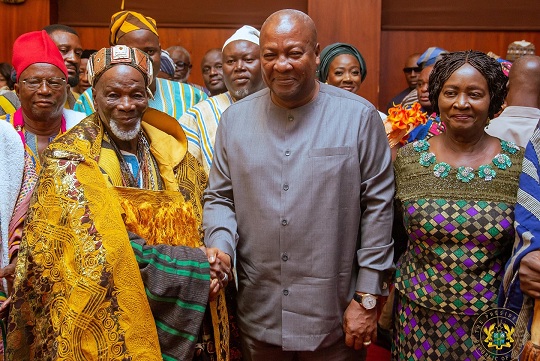The time has come for progress and development in Dagbon, following years of peace under the leadership of Yaa Naa Abukari Mahama II.
President John Dramani declared this when the Yaa Naa visited the Jubilee House on Friday.
Speaking at the ceremonial reception, the President praised the Yaa Naa for his role in maintaining stability since his enstoolment in 2019, describing him as a “peace-loving person” who has kept Dagbon tranquil after the resolution of the protracted chieftaincy crisis.
“And since he mounted the skins, Dagbong has been at peace. As I said, he’s a peace-loving person. And now that we have peace in Dagbong, it is time for us to have progress and development in Dagbong,” the president told the gathering.
President Mahama mentioned plans to transform the northern region through targeted investments in agriculture, infrastructure, healthcare, and youth development.
Under the Northern Savannah Economic Transformation Programme, the government plans to develop over 10,000 hectares of irrigated land in the Nasia, Dungu, and Bulung areas, creating jobs for over 8,000 young farmers and boost rice, maize, and soya bean production.
The president announced plans to establish Yendi, Sablugu, and Karaga as major agribusiness processing centers, part of a broader strategy to turn the northern region into an agro-industrial hub.
He stated that The government will also strengthen the shea and cashew value chains with expanded processing centers in Tamale and market linkages in Tolong and Sabzugu.
“The people of Dagbanu have waited long for peace, and so now they deserve progress and development. The time for promises has passed. What we must now deliver is results,” Mahama emphasized, acknowledging the patience of the people during the years of conflict.
The National Apprenticeship Programme, launched in Tamale, will train over 5,000 youths from the northern region in employable skills including carpentry, welding, tailoring, and agribusiness.
He also announced plans to launch a pilot 24-hour economic zone in the northern region to create extended business opportunities.
Healthcare improvements include the rehabilitation of Yendi Municipal Hospital and construction of two new Community-based Health Planning and Services compounds at Napache and Kwanjaga.
"The government will deploy 30 additional community nurses across rural Dagbon by December under the Mahama CARES policy framework," he added.
Infrastructure development will focus on the Northern Roads Improvement Corridor, including upgrades to the Tamale-Yendi-Tatale Corridor and roads connecting Sanguli, Saboba, and Bimbila.
The Eastern Corridor Road project will also receive attention with completion of segments from Asikuma to Nkwanta, Nkwanta to Dadieso, and Nakpanduri to Kulungungu.
He noted that water supply projects will benefit 50 underserved communities in Dagbon through the Community Infrastructure Development Fund, with the European Union providing funding for the Yendi water supply system and Tamale water expansion project.
“The Savannah region is going to benefit from increased water supply, so that the people will stop saying, ‘there is no water,” Mahama said, referencing the local expression for water scarcity.
The president also announced the creation of a Traditional Leadership Support Fund to finance preservation of royal archives, rehabilitation of palaces, and logistical support for traditional councils, including the Dagbon Traditional Council.
He praised the Yaa Naa’s peace-building efforts beyond Dagbon, acknowledging his interventions in disputes across Mamprusi, Gonja, and the Eastern Corridor.
Mahama promised government support for commemorating the fifth anniversary of the Yaa Naa’s enstoolment, describing it as “an occasion of national importance” that will reflect “the glory and resilience of your reign.”
The president emphasized that traditional authority remains consequential in shaping the nation, declaring that his government will partner with traditional rulers rather than sideline them.





